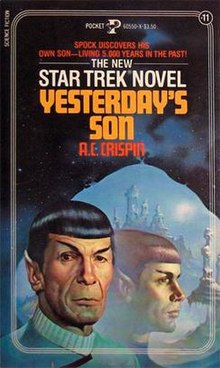
The Romulans are an extraterrestrial race in the American science fiction franchise Star Trek. They first appeared in the series Star Trek (1966–1969). They have appeared in most subsequent Star Trek releases, including The Animated Series, The Next Generation, Deep Space Nine, Voyager, Enterprise, Discovery and Picard. They have also appeared in the Star Trek feature films Star Trek V: The Final Frontier (1989), Star Trek VI: The Undiscovered Country (1991), Star Trek: Nemesis (2002) and Star Trek (2009). They also appear in various other spin-off media, including books, comics, toys and games.

Vulcans are a fictional extraterrestrial humanoid species in the Star Trek universe and media franchise. In the various Star Trek television series and movies, they are noted for their attempt to live by logic and reason with as little interference from emotion as possible. Known for their pronounced eyebrows and pointed ears, they originate from the fictional planet Vulcan. In the Star Trek universe, they were the first extraterrestrial species to make contact with humans.

Sarek is a fictional character in the Star Trek media franchise. He is a Vulcan astrophysicist, the Vulcan ambassador to the United Federation of Planets, and father of Spock. The character was originally played by Mark Lenard in the episode "Journey to Babel" in 1967. Lenard later voiced Sarek in the animated series, and appeared in Star Trek films and the series Star Trek: The Next Generation.
"The City on the Edge of Forever" is the twenty-eighth and penultimate episode of the first season of the American science fiction television series Star Trek. Written by Harlan Ellison, contributors and/or editors to the script included Steven W. Carabatsos, D. C. Fontana and Gene L. Coon. Gene Roddenberry made the final re-write. The episode was directed by Joseph Pevney and first aired on NBC on April 6, 1967.

Saavik is a fictional character in the Star Trek universe. She first appeared in the film Star Trek II: The Wrath of Khan (1982) played by Kirstie Alley. Robin Curtis took over the role for Star Trek III: The Search for Spock (1984) and Star Trek IV: The Voyage Home (1986).

"Unification" is a two-part episode of the syndicated American science fiction television series Star Trek: The Next Generation which features Leonard Nimoy as Spock. The first of the two episodes earned a 15.4 household Nielsen rating, drawing over 25 million viewers, making it one of the most watched episodes in all seven seasons of The Next Generation's run.
This article discusses the fictional timeline of the Star Trek franchise. The franchise is primarily set in the future, ranging from the mid-22nd century to the late 24th century with the third season of Star Trek: Discovery jumping forward to the 32nd century. However the franchise has also outlined a fictional future history of Earth prior to this, and, primarily through time travel plots, explored both past and further-future settings.
The Star Trek Expanded Universe is an official, created term to describe an extrapolation of events which occur in the Star Trek Universe outside the scope of the television series, feature films and novels. Information from the Star Trek "Expanded Universe" typically fills "holes" and is considered to be “canon” in the Star Trek story and timeline, with explanations of events which have never been adequately explained through live action productions. The term was first used in 1966 by writer D.C. Fontana to describe information put forth in the backstory of Doctor Leonard McCoy.
"The Enterprise Incident" is the second episode of the third season of the American science fiction television series Star Trek. Written by D. C. Fontana and directed by John Meredyth Lucas, it was first broadcast September 27, 1968.
"All Our Yesterdays" is the twenty-third and penultimate episode of the third season of the American science fiction television series Star Trek. Written by Jean Lisette Aroeste and directed by Marvin Chomsky, it was first broadcast March 14, 1969.
Ann Carol Crispin was an American science fiction writer, the author of twenty-three published novels. She wrote several Star Trek and Star Wars novelizations and created an original science fiction series called StarBridge.
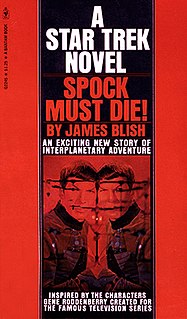
Spock Must Die! is an American science fiction novel written by James Blish, published February 1970 by Bantam Books. It was the first original novel based on the Star Trek television series intended for adult readers. It was preceded by a tie-in comic book line published by Gold Key and the novel Mission to Horatius by Mack Reynolds, all intended for younger readers.
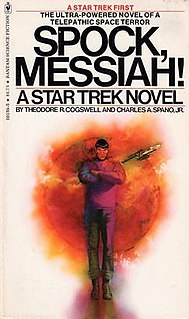
Spock, Messiah! is the second original novel based on television series Star Trek intended for adult readers, written by Theodore R. Cogswell and Charles A. Spano, Jr. It was preceded by Spock Must Die! (1970), and Mission to Horatius (1968). However, Mission was intended for young readers.

The Price of the Phoenix by Sondra Marshak and Myrna Culbreath, is an original novel based upon the 1960s television series Star Trek. It was first published by Bantam Books in 1977, and reissued by Corgi and Titan Books in the UK.
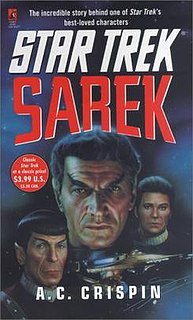
Sarek is a novel by A. C. Crispin, set in the fictional Star Trek universe. It is set shortly after the motion picture Star Trek VI: The Undiscovered Country. Ambassador Sarek of Vulcan discovers evidence of a complicated plot to cripple the United Federation of Planets; he must work to find out who is behind it while also coming to terms with the death of his human wife, Amanda Grayson. A secondary storyline follows the adventures of Peter Kirk, nephew of James T. Kirk, who inadvertently becomes caught up in the enemy's schemes.
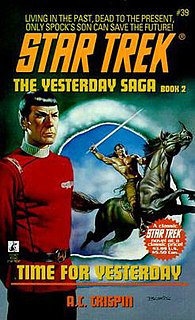
Time For Yesterday is a science fiction novel by American writer A. C. Crispin set in the fictional Star Trek Universe. It is a sequel to Crispin's earlier novel, Yesterday's Son, and describes a second encounter between the crew of the USS Enterprise and Spock's son, Zar.

My Enemy, My Ally is a Star Trek: The Original Series novel written by Diane Duane.

Killing Time is a Star Trek: The Original Series novel written by Della Van Hise and published by Pocket Books in 1985. The original manuscript had Kirk/Spock slash fiction elements, and these were requested to be removed by Paramount. However, they were not removed, and 250,000 copies were printed. These romantic undertones between Spock and James T. Kirk were brought to the attention of the office of the creator of Star Trek, Gene Roddenberry, who made Pocket Books recall the first edition. This edition subsequently became a collector's item, with more than fifty changes made to a revised version.

The Pandora Principle is a science fiction novel by American writer Carolyn Clowes, part of the Star Trek: The Original Series. It features the origin story of Saavik, and how she came to know Spock.

Doctor's Orders is a Star Trek: The Original Series novel written by Diane Duane.
